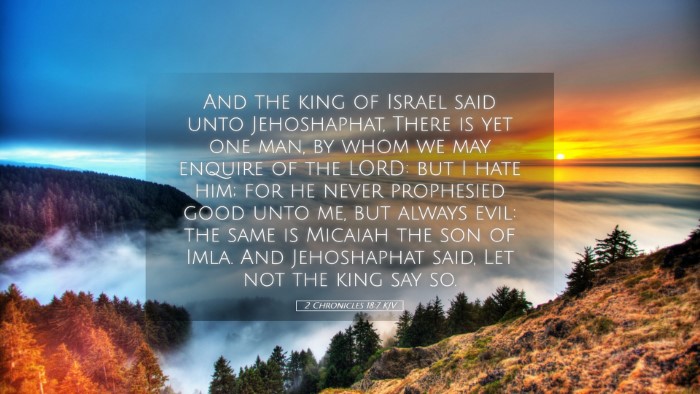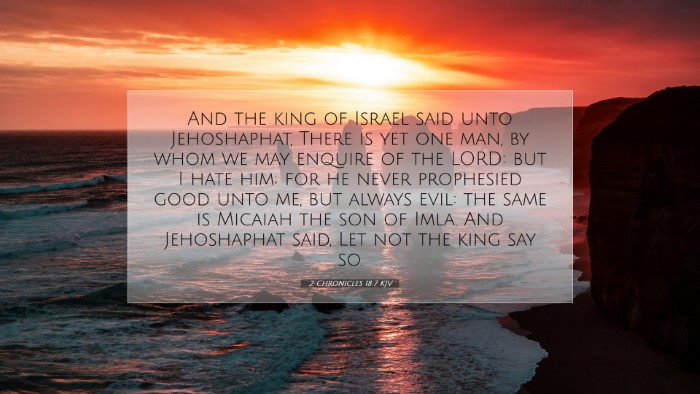Bible Commentary on 2 Chronicles 18:7
Verse: 2 Chronicles 18:7 (KJV) - "And the king of Israel said unto Jehoshaphat, There is yet one man, by whom we may inquire of the LORD: but I hate him; for he never prophesied good unto me, but always evil: the same is Micaiah the son of Imlah. And Jehoshaphat said, Let not the king say so."
Context and Background
This verse occurs within a broader narrative concerning King Ahab of Israel and King Jehoshaphat of Judah. At this juncture, Jehoshaphat has allied with Ahab to venture into battle against Ramoth-gilead. The necessity of consulting a prophet of the Lord is emphasized, reflecting the hunger for divine guidance amid political alliances and military endeavors. Ahab's disdain for Micaiah symbolizes the tension between true prophetic voices and the kings whose desires lean toward favorable prophecy.
Insight from Commentators
Matthew Henry
Matthew Henry notes that the mention of Micaiah's prophecies indicates the king’s preference for false prophets who comfort him with flattering relief rather than confronting the reality of his actions. Ahab’s declaration that he "hated" Micaiah speaks volumes about the king’s heart; he was unwilling to receive a hard truth that challenged his sinful lifestyle and plans. The nature of Ahab's relationship with Micaiah serves as a warning to leaders today who might surround themselves with yes-men instead of truth-tellers.
Albert Barnes
Albert Barnes elaborates on the political climate and spiritual implications of Ahab's rejection of Micaiah. He emphasizes that true prophets often stand in opposition to the popular narrative. Ahab's remark reveals a deeper spiritual conflict, mirroring the struggle of good versus evil. Ahab’s dislike for Micaiah suggests a dismissive attitude toward divine authority, something that can lead nations to ruin, making it critical for leaders to heed true prophetic guidance even when it’s unwelcome.
Adam Clarke
Adam Clarke draws attention to the phrase "let not the king say so," spoken by Jehoshaphat. Clarke suggests that this plea serves as a reminder of the responsibility of leaders to embrace and listen to truth irrespective of personal feelings towards its messengers. Jehoshaphat, known for his righteous reign, signifies the contrast between his character and Ahab’s — one is seeking to do right before God while the other is self-serving. This dichotomy serves as a lesson in the importance of seeking true wisdom and counsel in leadership.
Theological Reflections
This passage presents a ripe ground for theological reflection on the nature of prophetic ministry. The struggle between Ahab and Micaiah embodies a broader biblical theme: the contrast between light and darkness, truth and falsehood. In modern terms, it challenges clergy and laity alike to be vigilant about listening for the true voice of God in their midst.
Prophetic Voice in Leadership
- Demand for Authenticity: Leaders must seek and appreciate the counsel of those who stand firm on God’s truth, even if it disrupts personal agendas.
- The Cost of Truth: Micaiah represents the often-unpopular voice that calls for accountability. Embracing prophetic voices may require sacrifice and the readiness to confront uncomfortable truths.
Encouragement for the Faithful
- Boldness in Proclamation: Micaiah's courage to speak the truth serves as an encouragement for believers today to remain steadfast in the face of opposition.
- Divine Assurance: Those who stand in prophetic roles can take comfort that their mission is vital in the broader narrative of God’s redemptive plan.
Conclusion
In conclusion, 2 Chronicles 18:7 provides significant insights into the nature of leadership, the role of prophets, and the importance of heeding God's word. The admonitions derived from this verse encourage all Christians, especially leaders, to remain open to constructive criticism from those who genuinely seek God’s truth, much like Jehoshaphat, who demonstrates the necessity of valuing prophetic voices both then and now.


